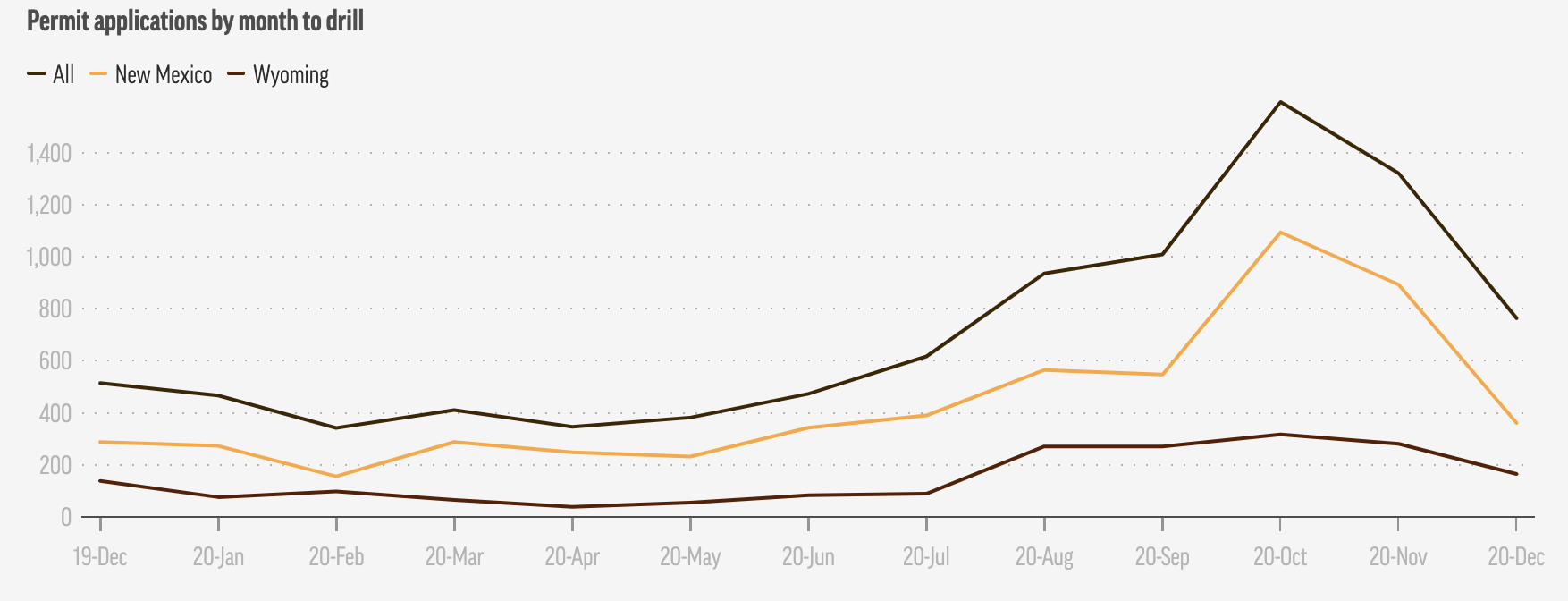President-elect Joe Biden’s plan to cease new drilling on federal lands has made oil and gas companies file for permits in the dwindling days of the Trump Administration, mostly in New Mexico and Wyoming, where much of the drilling on federal lands takes place. The applications accelerated during the fall before the election peaked in November, aided by speedier permitting approvals since President Trump took office. President-Elect Biden wants to end new drilling on those lands as part of his transition to renewable energy, with the goal of making the nation carbon neutral by 2050 and the generating sector carbon neutral by 2035, a full 10 years prior to California’s target, which is already causing supply problems in the state.
Despite oil producers slashing budgets, major companies have been acquiring enough permits to keep pumping through Biden’s upcoming term realizing that the nation will still need oil and gas for many years into the future. Under President Trump, crude production from federal and tribal lands and waters increased sharply, topping a billion barrels in 2019, which was almost a third higher than the last year of the Obama Administration.

Companies submitted more than 3,000 drilling permit applications in a three-month period that included the election. Department of Interior officials approved almost 1,400 drilling applications, which is the highest number of approvals for that amount of time during Trump’s four-year term. The government approved about 500 new drilling permits in September alone, more than double the same month in 2019. In 2020, the Trump administration issued over 4,700 drilling permits, which is comparable to approval numbers from early last decade when oil peaked over $100 a barrel, about twice the current price.
Processing times for completed applications to the Bureau of Land Management dropped from almost 140 days on average in the last year of Obama’s administration to 44 days in fiscal year 2019, which is still much slower than many state permitting processes. In 2020, some companies had permits awarded in a little over a month; other permits took longer but an average time is not yet available.
Houston-based EOG Resources amassed the most permits this year—1,024, including 549 since September. In total, EOG has about 2,500 federal permits approved or in progress, which will allow oil and gas drilling for several years. Oklahoma-based Devon Energy collected the second-highest number this year, over 500, which is enough to cover the company’s desired drilling over the next presidential term.
More than 60 percent of the permit applications filed over the past year were in New Mexico, where about a quarter of the state budget comes from oil and gas revenues. Another 20 percent of the permit applications were filed in Wyoming, where the state budget has taken a one-third revenue hit primarily because of the oil downturn. In Wyoming’s Thunder Basin National Grassland, oil companies EOG Resources and Devon Energy were approved to drill three dozen wells. In Colorado, a dozen permits were approved or pending to drill in Pawnee National Grassland.
Companies want to lock in drilling rights on oil and gas leases on public lands where they make royalty payments on resources extracted that are lower than royalties on private or state-owned lands. Royalty rates on private or state-owned land can be twice as much as federal land, although other costs are associated with federal leases owing to federal requirements. Private and state lands have traditionally been more attractive to most operators who value certainty and timeliness.
For the Biden Administration to undo the awarding of these permits, it could be forced to pay millions of dollars to companies to get them to relinquish drilling rights. This occurred in Montana where officials spent decades trying to buy out companies with drilling leases near Glacier National Park, and has occurred in the past in the federal Outer Continental Shelf.
If Biden does not immediately ban new drilling permits, he could place a moratorium on them to study the situation in more detail. Most companies have up to two years to act on federal permits, so a one-year moratorium would not have much impact on current oil supply and production could shift to private or state-owned land. If a ban were put on new federal drilling permits, U.S. production could fall by about 1 million barrels per day, or about 10 percent, by 2024, which would impact U.S. supply and existing energy independence.
Conclusion
Oil and gas companies that drill on federal lands submitted applications for drilling beginning before the election so that they would have a sufficient supply to last this presidential term and supply the United States with needed oil and gas to keep our transportation sector in petroleum, our homes with heat, and our electric generators with fuel. President-elect Biden wants to end the energy independence that the United States achieved under President Trump’s energy dominance policy so that Biden can make the United States carbon neutral by 2050. Biden needs to learn from China’s actions that they view energy as a national security priority; China is into all energy forms and its economy is growing. But Biden instead will return the United States to the Paris Accord, make the United States meet ridiculous greenhouse gas reduction goals, which China and other countries are not required to do, and as a result risk bringing this country to its energy and economic downfall.